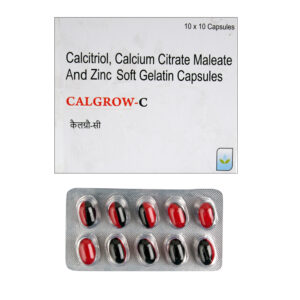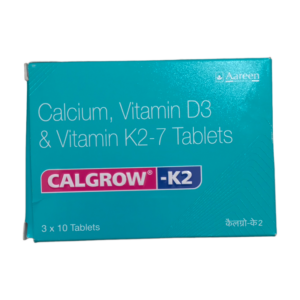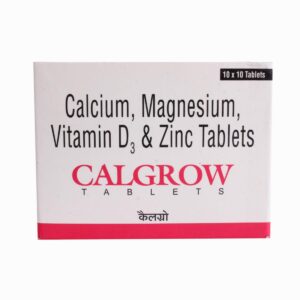METHYLCOBALAMIN + CALCITRIOL + CALCIUM CITRATE + LYCOPENE + MAGNESIUM SULPHATE + OMEGA-3 FATTY ACIDS + L-METHYLFOLATE + PYRIDOXAL-5-PHOSPATE
Methylcobalamin: Methylcobalamin is a form of vitamin B12 that is essential for the proper functioning of the nervous system and the production of red blood cells. It is often used as a supplement to treat vitamin B12 deficiencies.
The mechanism of action of Methylcobalamin involves its conversion to coenzyme B12, which is required for the synthesis of methionine from homocysteine. This conversion is important for the maintenance of healthy nerve cells and the formation of myelin, a protective coating around nerves.
Methylcobalamin is available in oral tablet form, as well as in injectable form for individuals who are unable to absorb vitamin B12 through the digestive system. The recommended dose varies depending on the specific condition being treated and individual factors. Typically, a daily oral dose of 1-2 mg is recommended for adult patients with vitamin B12 deficiency. For injections, a healthcare professional typically administers doses of 1,000-5,000 mcg once a day for several days, followed by a lower maintenance dose.
Methylcobalamin is generally considered safe and well-tolerated when used as directed. However, like any medication, it can cause some side effects. Common side effects may include nausea, diarrhea, headache, dizziness, and skin rash. In rare cases, allergic reactions such as itching, hives, or difficulty breathing may occur and require immediate medical attention. If any side effects or adverse reactions occur, it is important to consult a healthcare professional.
Calcitriol: Calcitriol is a form of vitamin D that is used as a supplement to treat or prevent low levels of calcium in the blood in patients with conditions such as hypoparathyroidism, renal osteodystrophy, and postmenopausal osteoporosis. It is also used to support normal bone development and mineralization in children with hypocalcemia or rickets.
The mechanism of action of Calcitriol involves binding to and activating specific vitamin D receptors in various cells, including those in the intestine, kidney, bone, and parathyroid glands. This activation promotes the absorption of calcium and phosphorus from the intestine, enhances the reabsorption of calcium from the kidney, and stimulates the release of calcium from bone, all of which help maintain normal calcium levels in the blood.
The dose of Calcitriol varies depending on the condition being treated and the patient’s individual needs. It is available as oral capsules, oral solution, and injection. It is important to follow the prescribed dosage and administration instructions given by the healthcare provider.
Like any medication, Calcitriol may have side effects. Common side effects include increased thirst, frequent urination, loss of appetite, stomach pain, constipation, nausea, and vomiting. Some patients may also experience headache, weakness, dizziness, or bone pain. If any of these side effects persist or worsen, it is recommended to notify the healthcare provider.
It is important to note that Calcitriol may interact with other medications, so it is crucial to inform the healthcare provider of all current medications and medical history before starting treatment. Additionally, Calcitriol should not be used in patients with high levels of vitamin D or calcium, kidney stones, or certain metabolic disorders.
Overall, Calcitriol is an effective medication used to regulate calcium levels in the body. However, it should only be used under the supervision of a healthcare professional, who will monitor the patient’s blood calcium and vitamin D levels regularly to ensure optimal dosing and safety.
Calcium Citrate: Calcium citrate is a medication that is commonly used to supplement calcium levels in the body. It is typically taken orally in the form of a tablet or capsule.
The main function of calcium citrate is to provide the body with additional calcium, which is an essential mineral for the development and maintenance of healthy bones and teeth. Calcium is also involved in proper muscle function, nerve transmission, and blood clotting.
When taken orally, calcium citrate is absorbed in the small intestine and then transported to various tissues in the body where it is needed.
The recommended dose of calcium citrate depends on several factors, including age, sex, and the reason for supplementation. However, the typical daily dose for adults is around 1000-1200 mg, divided into two or three smaller doses throughout the day. It is important to read and follow the instructions provided by your healthcare provider or the product label.
While calcium citrate is generally considered safe when taken at recommended doses, some individuals may experience side effects. Common side effects include constipation, bloating, gas, and stomach upset. These side effects are usually mild and can be minimized by taking the medication with food or increasing fluid intake.
In rare cases, high doses of calcium citrate or long-term use can lead to more serious side effects, such as kidney stones or hypercalcemia (high levels of calcium in the blood). Therefore, it is important to discuss with your healthcare provider before starting calcium citrate supplementation, especially if you have a history of kidney problems or are taking other medications.
Overall, calcium citrate is a widely used and effective medication for supplementing calcium levels in the body. However, it is important to use it as directed and consult with a healthcare professional if you have any concerns or experience any unusual symptoms.
Lycopene: Lycopene is a naturally occurring compound found in several fruits and vegetables, most notably tomatoes. It is considered a powerful antioxidant and is widely used as a dietary supplement. Lycopene is best known for its potential benefits in promoting prostate and heart health.
The mechanism of action of lycopene involves its ability to scavenge free radicals in the body. Free radicals are unstable molecules that can cause cellular damage and contribute to the development of various diseases. As an antioxidant, lycopene helps neutralize these free radicals, reducing oxidative stress and inflammation.
Lycopene can be taken as a supplement in the form of capsules, tablets, or softgels. The recommended dosage varies depending on the specific health condition being targeted. For general antioxidant support, a typical dosage range is 6-15 mg per day. However, for specific conditions like prostate health, doses up to 30 mg per day may be recommended.
Overall, lycopene is considered safe for most individuals when consumed in the recommended doses. However, some individuals may experience mild side effects such as diarrhea, nausea, or an upset stomach. People with an allergy to tomatoes or tomato-based products should avoid lycopene supplements. Additionally, lycopene may interact with certain medications, so it is important to consult with a healthcare professional before starting any new supplement regimen.
Magnesium Sulphate: Magnesium Sulphate, also known as magnesium sulfate or Epsom salt, is a medication that is used for various medical purposes. It is classified as an electrolyte and mineral supplement. Magnesium Sulphate is available in several forms, including intravenous solution, injection, and oral solution.
Magnesium Sulphate has multiple uses in the medical field. It is commonly used to prevent or treat low magnesium levels in the body, also known as hypomagnesemia. This condition can occur due to various factors such as malnutrition, alcoholism, or certain medical conditions. In addition, Magnesium Sulphate is often administered to pregnant women as a treatment for pre-eclampsia or to prevent seizures in pregnant women with eclampsia.
The mechanism of action of Magnesium Sulphate involves its ability to increase the levels of magnesium in the body. Magnesium is essential for numerous biochemical reactions and plays a vital role in maintaining proper nerve and muscle function, heart rhythm, and bone health. By replenishing magnesium stores, Magnesium Sulphate helps restore the normal balance of this mineral and addresses the deficiencies that may arise due to various health conditions.
The dosage and administration of Magnesium Sulphate vary depending on the specific medical condition being treated. The drug is usually given under the supervision of a healthcare professional, especially when administered intravenously or by injection. For low magnesium levels, the typical adult dose ranges from 1 to 2 grams of magnesium sulfate intravenously or intramuscularly. For pre-eclampsia or eclampsia, the dosage and administration are determined by the healthcare provider based on the severity of the condition.
As with any medication, Magnesium Sulphate may have potential side effects. Common side effects include flushing, sweating, dizziness, weakness, nausea, and a sensation of warmth. These symptoms are usually temporary and subside without medical intervention. However, more severe side effects can occur in rare cases, such as irregular heartbeat, chest pain, breathing difficulties, and allergic reactions. It is important to seek immediate medical attention if any of these occur.
In conclusion, Magnesium Sulphate is a medication used to treat or prevent magnesium deficiencies, particularly in cases of hypomagnesemia and pre-eclampsia/eclampsia during pregnancy. It replenishes magnesium levels in the body, promoting normal nerve, muscle, and cardiovascular function. However, it is essential to consult a healthcare professional for appropriate dosing and monitoring to minimize the risk of side effects and ensure its safe and effective use.
Omega-3 Fatty Acids: Omega-3 fatty acids are a type of polyunsaturated fatty acids that are essential for our body’s functions. They are commonly found in fish oil, as well as certain nuts and seeds. Omega-3 fatty acids are known for their numerous health benefits, particularly in maintaining heart and brain health.
The primary use of omega-3 fatty acids is to prevent and manage certain conditions related to the heart and blood vessels. They have been shown to reduce the risk of heart disease by decreasing triglyceride levels, reducing inflammation, and preventing clot formation. Omega-3 fatty acids may also help to lower blood pressure and improve overall cardiovascular function.
The exact mechanism of action of omega-3 fatty acids is not fully understood, but they are thought to exert their effects by modifying cell membrane properties, reducing the production of inflammatory substances, and influencing gene expression. The two main types of omega-3 fatty acids found in fish oil are eicosapentaenoic acid (EPA) and docosahexaenoic acid (DHA), which are believed to be the key components responsible for the beneficial effects.
The recommended daily dose of omega-3 fatty acids varies depending on the specific health condition being targeted. For general health maintenance, a daily intake of 250-500 mg of combined EPA and DHA is often recommended. However, for individuals with elevated triglyceride levels, higher doses of 2-4 grams per day may be prescribed under medical supervision.
Omega-3 fatty acids are generally considered safe for most people when consumed in recommended doses or obtained through dietary sources. However, some potential side effects can occur, including a fishy aftertaste, gastrointestinal upset, and an increased risk of bleeding. People with bleeding disorders, taking blood-thinning medications, or allergic to fish should exercise caution and consult a healthcare professional before starting omega-3 fatty acid supplementation.
Overall, omega-3 fatty acids are a beneficial supplement for maintaining heart and brain health. However, it is important to discuss with a healthcare professional before starting any new supplement or medication to ensure it is suitable for individual circumstances.
L-Methylfolate: L-Methylfolate, also known as levomefolic acid, is a medication that is used to treat folate deficiency and certain types of depression. It is a form of folate, which is a B vitamin that plays a crucial role in many bodily functions, including the production of red blood cells and the synthesis of DNA.
The main mechanism of action of L-methylfolate is to provide the body with the active form of folate that can be readily used by the cells. It bypasses the need for the body to convert folic acid into the active form, as some individuals may have difficulties with this process. By providing the necessary folate, L-methylfolate helps to support proper brain function, improve mood, and alleviate depressive symptoms.
The dose of L-methylfolate can vary depending on the individual’s condition and the recommendation of their healthcare provider. Typically, the recommended daily dose for treating depression ranges from 7.5 mg to 15 mg.
Common side effects of L-methylfolate may include headaches, irritability, nausea, and digestive disturbances. In rare cases, allergic reactions such as rash and difficulty breathing may occur. It is important to consult with a healthcare professional before starting L-methylfolate to determine the appropriate dosage and to address any potential side effects or interactions with other medications.
Pyridoxal-5-Phospate: Pyridoxal-5-Phosphate (PLP) is the active form of vitamin B6 and is a coenzyme involved in several important biochemical reactions in the body. It is often used as a dietary supplement to treat vitamin B6 deficiencies or to support specific medical conditions.
The primary use of Pyridoxal-5-Phosphate is to support the metabolism of proteins, carbohydrates, and fats, as well as the synthesis of neurotransmitters such as serotonin, dopamine, and gamma-aminobutyric acid (GABA). It plays an essential role in the formation of red blood cells, the maintenance of a healthy immune system, and the regulation of hormone activity.
The recommended dose of Pyridoxal-5-Phosphate varies depending on the individual’s age, sex, and specific medical condition. It is important to consult a healthcare professional or follow the instructions on the supplement label for appropriate dosing.
Pyridoxal-5-Phosphate is generally considered safe when taken at recommended doses. However, like any medication or supplement, there can be potential side effects. These may include nausea, vomiting, stomach pain, headache, tingling or numbness in the extremities, and difficulty coordinating movements. In rare cases, hypersensitivity reactions may occur, causing itching, rash, or difficulty breathing. If any severe or persistent side effects are experienced, medical attention should be sought immediately.
It is important to note that Pyridoxal-5-Phosphate should not be taken without medical supervision in individuals with certain medical conditions, such as kidney disease or certain types of anemia. Additionally, it may interact with certain medications, including levodopa, phenytoin, and certain antibiotics. It is crucial to inform a healthcare professional of any existing medical conditions or medications being taken before starting Pyridoxal-5-Phosphate supplementation.




